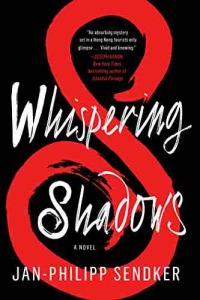Whispering Shadows by Jan-Philipp Sendker
 Wednesday, April 15, 2015 at 9:26AM
Wednesday, April 15, 2015 at 9:26AM 
First published in German in 2007; published in translation by Atria on April 14, 2015
I liked The Art of Hearing Heartbeats, although I had reservations about the novel's late stages. Readers who loved that 2002 novel will probably like Jan-Philipp Sendker's 2007 novel less. While both books explore the intersection of the East and West, The Art of Hearing Heartbeats is fundamentally a love story. Whispering Shadows is more a novel of international intrigue, although a love story lurks within its pages. I think Whispering Shadows is a superior novel, but readers looking for another Art of Hearing Heartbeats might be disappointed.
Paul Leibovitz is the son of a Jewish father and a German mother, but only in Asia does he feel at home. The death of his son in Hong Kong turns Paul into a hermit. Three years after that death, Paul, now divorced, has an ambiguous interest in a woman named Christine but he resists the notion of having a girlfriend or, for that matter, a life. He prefers to brood for fear that moving on will cause him to lose his memories of his son.
On a rare trip from his home on Lamma Island to the island of Hong Kong, Paul meets Elizabeth Owen. Paul has little interest in her problems but when she tells him that her adult son has disappeared in China, he agrees to contact a friend named Zhang in the Shenzhen police who might be able to help. Christine, who has a deep distrust of Chinese officials based on a family tragedy, urges Paul not to become involved. The discovery of a violent death in Shenzhen sucks Paul into a quagmire. He doesn't want to get involved, but destiny or karma intercedes when Zhang asks for his help ... or perhaps Paul realizes that the time has come to start making choices.
Eventually the novel shifts to the perspectives of other characters. One is Victor Tang, a Chinese entrepreneur who has benefitted from the intersection of criminality and capitalism. Another is Richard Owen, who objected on grounds of patriotism to his son's plan to close the family's manufacturing plant in Wisconsin in favor of manufacturing in China. The final primary character is Zhang. He is a familiar character in fiction, the honest cop who opposes corruption, although as a Buddhist in China he doesn't fit the "cop novel" stereotype.
All of the characters are realistic, in part because their behavior is often less than ideal. To a degree, they are all selfish and self-absorbed. For good reason, Zhang is fearful to the point of paralysis. Having rejected the childhood lies his country told him about the benefits of shared sacrifice, Tang craves power. Richard is jealous of his son. Christine is controlling while Paul has walled himself off from emotion and human contact. They are all wrestling with their pasts and, in the case of the Chinese characters, with the impact of Mao's China on their pasts. Part of the novel's intrigue comes from wondering whether the characters will overcome those issues.
America's progression from Buy American to Fire Americans, and the notion that the American Dream is now (in altered form) the Chinese Dream, are among the novel's most interesting themes. Another important theme is the inability of people who grow up in a free nation to understand how oppression and the hunger for freedom shapes behavior. Still another is whether truth exists as an objective fact or whether truth is what people with power decide it should be. The cousin of truth is trust. Can we trust those who conceal the truth? Does the answer depend on the reason for hiding the truth? Finally, the novel explores the theme of bravery. Doing the right in the face of risk is an act of bravery, but is it also an act of stupidity if it will destroy your life without preventing evil from being done?
As he did in The Art of Hearing Heartbeats, Jan-Philipp Sendker writes of passion with honesty and intensity, from physical and emotional perspectives. He gives key characters a variety of interesting conflicts. Whispering Shadows fails to generate much suspense and the plot did not grab me on an emotional level, but the interaction of the characters creates dramatic tension. The story moves forward at a comfortable pace and reaches a satisfying conclusion.
RECOMMENDED
Reader Comments